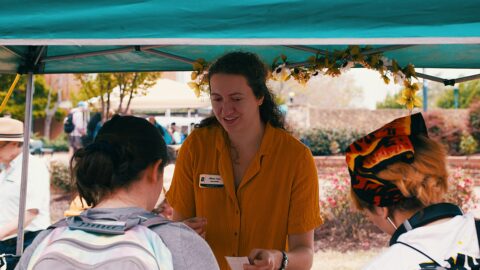by Sarah Latto
When I first saw the email advertising the ‘Risk Factor’ event, the subject line, ‘⚠ Can you manage risk and flexible volunteering at the same time? ⚠’, asked a question that I had been grappling with for months. I didn’t hesitate in booking, despite the minor consideration of an 800 mile round trip!

We’re not alone in this balancing act
Like many organisations, we are investigating how best to respond to volunteers’ increasing demand for more flexible or episodic volunteering. I suspect Shelter Scotland are not alone in finding it difficult to balance our formalised risk and safeguarding procedures with more informal volunteering. We’re reviewing our flexible role to make it more inclusive and volunteer led, but it’s proving difficult to ensure that such a flexible commitment is sustainable when we need to invest so much time in recruitment and training. It’s a bit of a catch 22!
As such, I was really looking forward to the event on the 21st May. I didn’t flinch when my alarm went off at 5.45am for my 7.30 train from Edinburgh to London, and even the 1.5 hour delay to my train didn’t dampen my spirits!

Sketch note from delegate at Risk factor event – Alison Faraday, British Red Cross
A sustainable flow of volunteers
I rushed in the door with two minutes to spare, having gulped down a bag of roasted peanuts and an apple for my lunch, and immediately got into the networking with other lovely volunteer managers. The event started soon afterwards, and we were introduced to Helen Johnston from the Thames Discovery Programme. Her presentation was really interesting, and definitely gave me lots of food for thought. She has about 750 volunteers who support archaeological exploration on the banks of the Thames in a really flexible model for participation.
I was interested to hear how they are able to keep the model sustainable given that it is such a skilled role with no minimum commitment required. This is likely, in part, because they charge for training, but also because they have a very pragmatic approach to risk. Indeed, she told the story of her volunteers who successfully dealt with finding an unexploded World War II bomb, without the need for her involvement.
As well as providing in depth training, they have developed a culture of safety by holding briefings at the start of each session and placing a lot of trust in their volunteers to make sensible judgements about risks they encounter. I think this emphasis on trust in volunteers is perhaps something that all of us large national organisations could learn from.

Risk versus objective reward
Secondly, Daniel Ingram from AVM led a discussion about risk appetite. My key takeaway point from this was that risk should not be assessed in isolation, but rather in line with the impact they would make in helping us achieve our objectives. If the activity is likely to be of significant benefit, perhaps it is worth the risk?
Next up, Catherine Bartlett from NCT told us about a volunteer led project with significant risks but also significant positive impact. Yet again, we were hearing about the balance between potential risk and actual benefits. Catherine, as a former barrister, highlighted the need to really take time to evaluate and understand your risks. Building detailed evidence to support your assessments will help to instil trust with colleagues and reassure the most risk averse!

Because you’re worth it
My trip to London for the AVM Risk Factor event was definitely worth the risk! It gave me lots of food for thought regarding our approach to risk in Shelter Scotland, and highlighted to me the value of two quite different approaches. I also had a far less eventful journey home too – Netflix, Pinot Grigio, chocolate raisins and six pages of notes to ponder!
Sarah Latto is the Volunteer Development Manager for Shelter Scotland and Co-Chair of the Scottish Volunteering Forum




